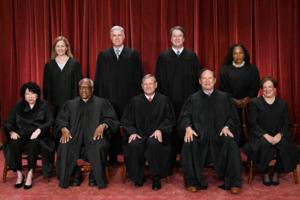Politics
/ArcaMax

Commerce Secretary Howard Lutnick says tariff pause on phones, computers is temporary
Smartphones, computers and other electronic devices that won exemptions from some U.S. tariffs will be part of a forthcoming levy on semiconductors, U.S. Commerce Secretary Howard Lutnick said, dampening what China had called a “small step” toward easing the trade fight between the world’s two biggest economies.
Lutnick, speaking Sunday ...Read more

China says US tariff break a 'small step' to fixing mistake
China’s government said the U.S. decision to exempt certain consumer electronics from its so-called reciprocal tariffs is a small step toward rectifying its wrongdoings and urged Washington to do more to revoke the levies.
President Donald Trump’s administration excluded smartphones, computers and other electronics from the increased import...Read more

At packed LA rally, Bernie Sanders says US facing 'extraordinary danger'
LOS ANGELES — Channeling the rage and frustration of progressive Californians, Vermont Sen. Bernie Sanders told tens of thousands of people in downtown Los Angeles on Saturday that the country is in a moment of “extraordinary danger.”
Clad in a blue button-down shirt and a Dodgers baseball cap, Sanders, 83, said President Donald Trump is ...Read more

Trump's foreign aid cuts are killing jobs for US contractors too
WASHINGTON — Weeks after Donald Trump won reelection, Keith Ives held an all-staff meeting at his Denver-based company to reassure his 30 employees that their work evaluating the success of U.S. aid projects overseas wasn’t under threat.
“I enthusiastically told them, ‘I’m not worried at all — the work we do isn’t political,’”...Read more

Teen killed parents in plot to assassinate Trump, 'save white race': FBI
A Wisconsin teenager is accused of killing his parents as part of an extremist plot to assassinate President Donald Trump and start a revolution to “save the white race,” newly unsealed federal court documents show.
Nikita Casap, 17, was arrested last month after his mother, 35-year-old Tatiana Casap, and stepfather, 51-year-old Donald ...Read more

Bay Area immigration lawyers assail Trump administration moves against migrants
SAN JOSE, Calif. — Bay Area advocates for foreign citizens living in the U.S. without authorization or with temporary legal status are decrying the Trump administration’s increasingly aggressive tactics against migrants.
“It has a huge impact in our region,” said San Francisco-based immigration lawyer Erin Quinn of the Immigrant Legal ...Read more

Apple, Nvidia score relief from US tariffs with exemptions
President Donald Trump’s administration exempted smartphones, computers and other electronics from its so-called reciprocal tariffs, representing a major reprieve for global technology manufacturers including Apple Inc. and Nvidia Corp. even if it proves a temporary one.
The exclusions, published late Friday by U.S. Customs and Border ...Read more

Will Donald Trump endorse in the GOP primary for New Jersey governor? Kellyanne Conway thinks so
PHILADELPHIA — Will Donald Trump make an endorsement in the New Jersey GOP primary for governor? Kellyanne Conway thinks so.
Conway, a pollster and former senior adviser to Trump who managed his successful 2016 presidential campaign, told reporters on Friday that she anticipates the president will make an endorsement in the GOP primary. ...Read more

Bill Maher says Trump is only playing role of 'crazy person' after White House dinner
Bill Maher capped off his usual jabs at President Donald Trump’s administration by saying the Don is only playing the role of “a crazy person,” describing him as “self-aware” and “measured” following a recent White House dinner.
During Friday’s episode of “Real Time With Bill Maher,” the self-proclaimed centrist launched ...Read more

Gavin Newsom wants nations to exempt California goods from tariffs. That's unlikely, experts say
SAN JOSE, Calif. — As President Donald Trump blasts American allies and adversaries alike for “unfair trade” and sets steep tariffs, California Governor Gavin Newsom has a different message for the nations of the world.
“Donald Trump’s tariffs do not represent all Americans,” the Democrat said in a video posted on social media last ...Read more

Germany's Merz says Trump tariffs risk fanning a financial crisis
German Chancellor-in-waiting Friedrich Merz said Donald Trump’s tariff policies increase the risk of a financial crisis and advocated for a U.S.-European free trade agreement, picking up on an idea that has drawn a hostile response from the U.S. president.
“Yes, I’m hoping for a new transatlantic free-trade accord,” Handelsblatt, a ...Read more

The Trump family is going all-in on crypto projects, from bitcoin mining to stablecoins
President Donald Trump and his family have taken a interest in just about every corner of the crypto industry.
There are nonfungible tokens and digital collectibles; a decentralized finance project; a proposed stablecoin; an effort at Bitcoin mining; and a pair of memecoins, one for the president and one for first lady Melania Trump.
Taken ...Read more

Iran, US agree to extend talks after 'constructive' meetings
Iran said the first formal talks with U.S. President Donald Trump’s administration over its nuclear program were “constructive,” and the two sides said they’ll meet again in a week.
The two sides discussed Iran’s nuclear program and the lifting of sanctions “in a constructive atmosphere and with mutual respect,” the Iranian ...Read more

'I don't trust America.' Trump's tariffs, detentions take a toll on California tourism
LOS ANGELES — On Tuesday, a trickle of visitors traversed the sidewalks of star-studded Hollywood Boulevard, which is usually bustling this time of year with families and students on spring break trips. Parked open-air tour buses and vans were largely empty.
But Jose Ayon, manager at La La Land, a souvenir and gift shop, was not surprised. ...Read more

Apple, Nvidia score relief from US tariffs with exemptions
President Donald Trump’s administration exempted smartphones, computers and other electronics from its so-called reciprocal tariffs, representing a major reprieve for global technology manufacturers including Apple Inc. and Nvidia Corp. even if it proves a temporary one.
The exclusions, published late Friday by U.S. Customs and Border ...Read more

Apple, Nvidia score relief from US tariffs with exemptions
President Donald Trump’s administration exempted smartphones, computers and other electronics from its so-called reciprocal tariffs, representing a major reprieve for global technology manufacturers including Apple Inc. and Nvidia Corp. even if it proves a temporary one.
The exclusions, published late Friday by U.S. Customs and Border ...Read more

Supreme Court slows Trump's mass deportations, but doesn't stop them
WASHINGTON — The Supreme Court this week put an important check on President Donald Trump's power to arrest and quickly deport people who are alleged to be members of a foreign crime gang.
Those who face deportation "are entitled to notice and opportunity to challenge their removal" before a federal judge, the court said. They must be given "...Read more

Iran, US plan talks next week after 'constructive' meeting
Iran said the first formal talks with U.S. President Donald Trump’s administration over its nuclear program were “constructive” with both sides agreeing to meet again next week.
The two sides discussed Iran’s nuclear program and the lifting of sanctions “in a constructive atmosphere and with mutual respect,” the Iranian foreign ...Read more

Trump moves to hand military control of land near Mexico border
WASHINGTON — President Donald Trump issued a directive expanding military control over federal lands near the U.S.-Mexico border, seeking to bolster his efforts to crack down on undocumented migration.
In a memorandum released on Friday evening, Trump ordered several Cabinet secretaries to give the Defense Department jurisdiction over federal...Read more

4 women sued Idaho over abortion law. An Ada County judge just ruled partially in favor of them
BOISE, Idaho — An Ada County judge on Friday ruled partially in favor of four women who sued the state after they were denied health condition-related abortions in Idaho because of strict bans on the procedure.
The ruling puts in place the first clear carve-out of a health exception in the ban, a contentious issue that has sparked multiple ...Read more
Popular Stories
- Will Donald Trump endorse in the GOP primary for New Jersey governor? Kellyanne Conway thinks so
- At packed LA rally, Bernie Sanders says US facing 'extraordinary danger'
- Supreme Court slows Trump's mass deportations, but doesn't stop them
- Why America's elections will never be the same after Trump
- Iran, US plan talks next week after 'constructive' meeting


























































